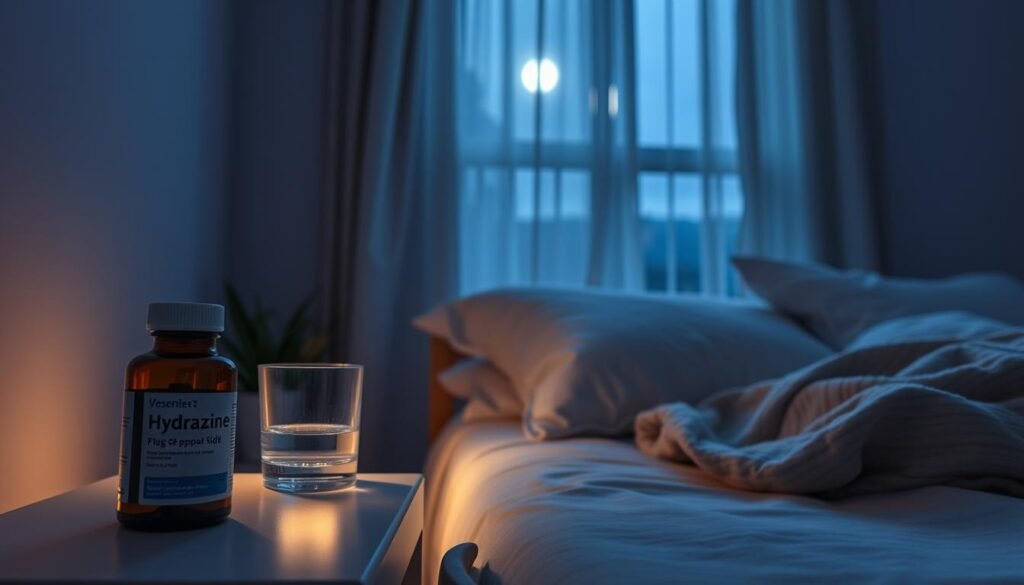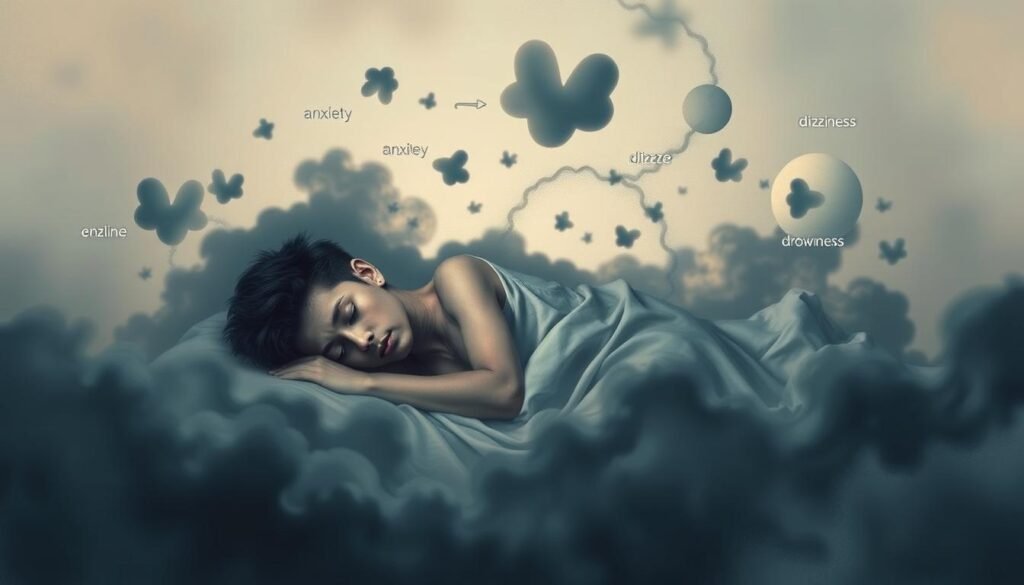About one in three adults struggle with insomnia at some point. Not everyone knows about effective treatments. Hydroxyzine, a first-generation antihistamine, helps manage insomnia safely. It’s important to know the right hydroxyzine dosage to aid sleep while avoiding side effects.
This guide looks at hydroxyzine dosages for insomnia treatment. It stresses the importance of medical advice to improve sleep and well-being.
Key Takeaways
- Hydroxyzine is an effective antihistamine for managing insomnia.
- Correct dosing is essential for maximizing sleep benefits while minimizing risks.
- Healthcare provider consultation is necessary for proper dosage determination.
- Adult dosages typically range from 25mg to 100mg before bedtime.
- Hydroxyzine may lead to varying side effects in different individuals.
- Short-term use is recommended for optimal results in insomnia treatment.
- Alternatives to medication, like Cognitive Behavioral Therapy, are also available.
What is Hydroxyzine?
Hydroxyzine is a powerful first-generation antihistamine. It is known for easing allergy symptoms effectively. It also helps with sleep problems, especially insomnia. This makes hydroxyzine a go-to for many people.
Overview of Hydroxyzine as an Antihistamine
As a hydroxyzine antihistamine, it works by blocking histamine receptors. This reduces symptoms like itchy eyes, runny nose, and sneezing. Hydroxyzine also has a calming effect. This makes it useful in various treatments.
Uses Beyond Allergy Relief
Hydroxyzine is used for more than just allergies. Its uses include managing anxiety and tension. This is helpful in places like hospitals for calming patients before surgery.
It’s also prescribed for sleep troubles. Its sedative properties aid those battling insomnia. Though mainly for allergies, hydroxyzine’s range of uses benefits patients in many medical areas.
| Condition | Typical Dosage | Frequency |
|---|---|---|
| Allergy Relief | 10-50 mg | As needed |
| Anxiety | 50-100 mg | Four times a day |
| Insomnia | Off-label prescription, variable | Once daily, before bed |
| Itching | 25 mg | Three to four times a day |
How Does Hydroxyzine Help You Sleep?
Hydroxyzine improves sleep quality, which is crucial for those with insomnia. It works well because of its sedating power, mainly as an antihistamine. It connects sedation with better sleep, especially for those who are anxious or disrupted by other causes.
Understanding Sedation and Sleep
Sedation is key for deep sleep because it reduces arousal levels. Antihistamines like hydroxyzine stop the wake-up effect of histamine. Blocking histamine helps you feel relaxed and eases into sleep.
Mechanism of Action on the Central Nervous System
Hydroxyzine’s effect on the central nervous system shows why it helps sleep. It reaches the brain fast, in about 15-30 minutes. It calms brain activity, aiding in falling asleep faster and staying asleep longer. The drug works overnight with its 16-24 hours duration, keeping you calm.
| Factor | Details |
|---|---|
| Typical Dosage | 10-50 mg once daily before bed |
| Onset of Action | 15-30 minutes |
| Half-Life | 16-24 hours |
| Common Side Effects | Drowsiness, dry mouth |
| Habit-Forming | No |
| Interactions | Other sedatives, muscle relaxers, certain antibiotics |
Hydroxyzine Dosage for Insomnia
When you consider using hydroxyzine for sleep problems, knowing the right dose is key. Dosage usually varies from 10 to 50 mg, depending on the person’s needs and possible side effects. Doctors often start with a lower dose to see how well it’s tolerated.
Typical Dosage Recommendations
Hydroxyzine is often taken once before bed. It’s important to plan for at least seven hours of sleep after taking it. This helps lower the chance of feeling drowsy the next day, which can affect your day.
Factors Influencing Dosage
- Age: Older people might need smaller doses because they’re more sensitive to medicines.
- Gender: Studies have shown that women may react differently to hydroxyzine, so dose changes might be needed.
- Coexisting Conditions: Patients with ongoing pain or mental health issues might need different doses.
Importance of Following Doctor’s Instructions
It’s very important to follow the doctor’s hydroxyzine dosage directions. Not doing so can cause bad effects and reduce its helpfulness. Talking with your doctor can help adjust the dose as needed based on how you respond.
Short-term Use vs Long-term Use
Using hydroxyzine for insomnia in the short term is usually effective. Yet, using it for a long time might not work well. Studies suggest that long-term use can make sleep problems worse, leading doctors to look for other treatment options.
Hydroxyzine Insomnia Treatment
Hydroxyzine is getting noticed for its off-label prescription to help with insomnia. It’s not officially okayed in the U.S. for sleep issues. Yet, many doctors suggest it for those who can’t sleep well, especially if anxiety plays a role. Studies show hydroxyzine might improve sleep quality, offering a good solution for some.
Off-label Use for Sleep Disorders
Hydroxyzine’s value for insomnia comes from its ability to calm, helping people fall asleep more easily. Research points to taking 50mg to 100mg before bedtime as beneficial. However, it may cause side effects like drowsiness, a rapid heartbeat, and feeling dizzy. It’s important to be careful, as reactions differ. Always talk to a doctor to see if this hydroxyzine insomnia treatment fits you.
Alternatives to Hydroxyzine for Insomnia
Some people look for alternatives for insomnia away from prescription drugs. Cognitive behavioral therapy for insomnia (CBTi) is effective and safe, offering lasting help without undesirable effects. Natural solutions like melatonin, chamomile, and valerian root are gaining fans for those who prefer a more natural method. It makes sense to explore different options to discover the best fit, keeping in mind personal health needs and what feels right.
| Treatment Option | Type | Effectiveness | Side Effects |
|---|---|---|---|
| Hydroxyzine | Prescription | Good | Drowsiness, fast heartbeat, dizziness |
| Melatonin | Natural Supplement | Moderate | None or mild |
| Cognitive Behavioral Therapy (CBTi) | Therapeutic | High | None |
| Chamomile | Herbal | Moderate | Mild headaches, nausea |

Understanding Hydroxyzine Sleep Aid Effectiveness
Understanding how hydroxyzine helps with sleep is key for those struggling with insomnia and anxiety. This drug is mainly an antihistamine. But, its ability to aid sleep is also important.
How Hydroxyzine Compares to Other Sleep Medications
When compared to other sleep aids, hydroxyzine has a special action. It does not just affect the brain’s sleep areas. It also tackles anxiety, helping those with anxiety-driven insomnia. Hydroxyzine is less risky than other sleep aids, which may cause dependence.
Evidence Supporting Hydroxyzine’s Efficacy
Studies back up hydroxyzine’s effectiveness in bettering sleep quality. It helps people fall asleep quicker and wakes up less at night. This drug improves overall sleep, leading to better thinking, mood, and health. Yet, it’s meant for short-term use. A doctor’s advice on dosing and usage time is vital.
For those with anxiety and sleep troubles, hydroxyzine can be a fast solution. It starts working in about 30 to 45 minutes. This quick effect provides swift relief.
| Medication | Onset Time | Duration of Action | Risk of Dependence |
|---|---|---|---|
| Hydroxyzine | 30-45 minutes | Several hours | Low |
| Benzodiazepines | 15-30 minutes | 4-6 hours | High |
| Melatonin | 30-60 minutes | 4-5 hours | Very Low |
| Ambien (Zolpidem) | 15-30 minutes | 6-8 hours | Moderate |
Following a healthcare provider’s advice is crucial to get the most from hydroxyzine. It does more than improve sleep; it also helps with stress and anxiety. For more information on using medications like trazodone for sleep, visit this page.
Potential Side Effects of Hydroxyzine for Insomnia
Hydroxyzine is a choice for battling insomnia, but it’s key to know its side effects. Users may face common and serious issues that affect health and sleep quality.
Common Side Effects
Users often report several common side effects with hydroxyzine. They include:
- Drowsiness
- Dry mouth
- Fatigue
- Headaches
- Insomnia
- Nausea
- Weakness
- Low blood pressure
These side effects could be mild but might hinder daily tasks. Drowsiness is a notable one, which could counter the goal for those looking for sleep solutions.
Serious Side Effects and Risks
Serious risks of hydroxyzine demand attention. They don’t happen often but pose major health concerns. Some are:
- Abnormal heart rhythms
- Severe skin reactions
- Allergic reactions, which may lead to difficulty breathing
People with heart issues or on MAOIs must be extra careful. Keeping an eye on side effects ensures hydroxyzine use is safe. It helps in weighing the pros and cons for insomnia treatment.

Hydroxyzine Pediatric Insomnia
For kids with sleep issues, hydroxyzine must be given in child-specific dosages. This medication helps them sleep better. But, it’s crucial to get the dose right for safety and effectiveness.
Dosage and Administration in Children
Hydroxyzine is used for a short time in kids. The dose depends on the child’s age and weight. Here are the guidelines:
- Children 6 to 12 years old usually get 0.5 to 1 mg/kg per day, in divided doses.
- Kids 12 and up can take 25 to 50 mg at bedtime.
- It’s important to watch how the child reacts to the medication carefully.
Considerations for Pediatric Patients
When prescribing hydroxyzine to kids, many factors need consideration. A doctor should look at the child’s health, other medicines, and specific sleep problems. Here’s what to think about:
- Children might experience side effects like feeling more sleepy.
- It’s best to use the drug for a short period and not long-term.
- Parents should be part of the treatment plan to notice any bad effects.
For more details on how this medication works in children, check out this resource. When treating insomnia with hydroxyzine in kids, it’s important to talk to a doctor. Approaches without medication, help from parents, and changing routines also play a big role in treatment.
Managing Hydroxyzine Nighttime Anxiety
Anxiety and sleep problems often go hand in hand. Knowing how they connect helps us find ways to do better. When anxiety goes up, the quality of sleep usually goes down. This can make us feel more tired and anxious. For those looking at hydroxyzine for anxiety relief, especially at night, it’s seen as a good choice.
How Anxiety Can Affect Sleep
Anxiety can cause racing thoughts and worry, making sleep hard. This worsens our overall health. In fact, over 30% of US adults battle anxiety disorders that affect their sleep. This leads to more anxiety, creating a cycle of stress that needs breaking.
Role of Hydroxyzine in Anxiety Management
Hydroxyzine is often used for short-term anxiety and sleep troubles. Its calming effects are great for battling insomnia. Studies show it helps you fall asleep faster and sleep longer. For hydroxyzine nighttime anxiety, it can be really helpful. Adults usually take 50-100 mg up to four times a day, based on what they need. If you need a solid option, read up more in this detailed guide on hydroxyzine for anxiety relief.
| Dosage | Adult | Child (Under 6) |
|---|---|---|
| Typical Daily Dose | 50-100 mg, up to 4x daily | Up to 50 mg in divided doses |
| Onset of Action for Anxiety | 30-60 minutes | N/A |
| Onset of Action for Allergies | 15-30 minutes | N/A |
Drug Interactions to Be Aware Of
It’s key to know how hydroxyzine interacts with other drugs. Mixing it with certain medications can lead to sedation increased and create risky situations. You should know which drugs or substances might make hydroxyzine’s effects stronger or cause issues with heart rhythm.
Medications That Increase Sedation
Many drugs can make hydroxyzine’s calming effect even stronger. Be careful when you use these together:
- Benzodiazepines
- Opioids
- Sedative-hypnotics
- Antiarrhythmics
- Antidepressants
- Antipsychotics
- Antifungals
Taking these drugs with hydroxyzine might make central nervous system (CNS) depression worse. This means you could feel very sleepy, confused, or have a higher chance of falling or getting into accidents.
Impact on Heart Rhythm
Hydroxyzine can change how your heart beats, which is risky with drugs that also affect the heart’s rhythm. This is a big worry for people already having heart rhythm problems. The drugs below are particularly concerning:
- Antiarrhythmics
- Antibiotics
- Antidepressants
- Antipsychotics
If you have a history of long QT syndrome, stay away from hydroxyzine. It could make heart rhythm issues worse. Sometimes, changing doses or keeping a closer watch on patients can lower the risks with these drug combinations. For more information on sleep problems and how they’re treated, check out understanding the differences between insomnia and.
Alternatives and Non-Pharmacological Approaches
Seeking out effective alternatives for managing insomnia is crucial. This is especially true for those hesitant about medication, like first-generation antihistamines including hydroxyzine. There are many non-medication methods that can help. These alternatives offer a safer route to better sleep, without the side effects of drugs. By exploring these options, individuals can find a more lasting solution to their sleep problems.
Cognitive Behavioral Therapy for Insomnia (CBTi)
Cognitive Behavioral Therapy for Insomnia (CBTi) is a proven method for enhancing sleep. It tackles the thoughts and actions that hinder sleep. Through a structured approach, it assists individuals in:
- Identifying and changing negative thoughts about sleep
- Building better sleep habits
- Handling sleep-related anxiety
Studies show CBTi as a top alternative to hydroxyzine for insomnia. Its benefits are long-lasting and often surpass those of medications.
Other Lifestyle Changes for Better Sleep
Making lifestyle changes for sleep can also improve sleep quality. These changes need effort but can lead to big improvements:
- Keeping a regular sleep schedule
- Having a relaxing routine before bed
- Cutting down on screen time before sleep
- Avoiding caffeine and heavy food in the evening
- Trying out relaxation techniques like meditation or deep breathing
Adopting these habits can ease insomnia symptoms and lessen the need for pills. Plus, the benefits of these lifestyle changes for sleep extend beyond sleep. They improve overall health, making for more restful nights.

Conclusion
Knowing the hydroxyzine dosage for insomnia is key for effective sleep aid. This antihistamine helps with allergies and is great for sleep problems. It makes you sleepy and improves how well you sleep, helping you doze off quicker and stay asleep.
But, hydroxyzine is mainly a short-term solution for sleep issues. It’s important to know its side effects and how it fits your health needs. Talking to doctors helps tailor a treatment plan that includes hydroxyzine, offering a way to manage insomnia safely.
With ongoing studies on sleep meds like hydroxyzine, staying informed and active in treatment choices is vital. For more tips on sleep drugs and to enhance your sleep quality, check out this resource on sleep and medication interactions.